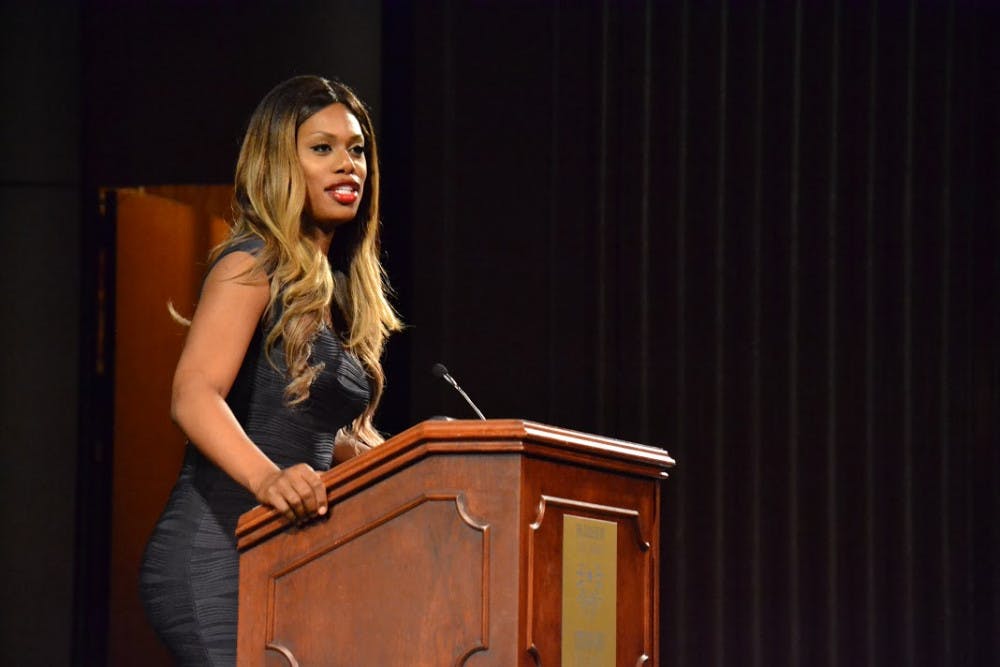By Sydney Shaw News Editor
When Laverne Cox introduced herself to students at the College, she refused to confine herself to a single label.
“I stand before you as a proud, African American, transgender woman,” Cox said. “I believe it is important to name the various intersecting components of my multiple identities because I’m not just one thing, and neither are you.”
During her “Ain’t I a Woman” lecture in Kendall Hall on Friday, Nov. 6, the “Orange is the New Black” actress and activist launched into statistics about the struggles transgender people face every day in the United States.
Citing the National Coalition of Anti-Violence Programs, Cox said over 50 percent of all LGBTQ homicide victims are trans women.
“This year is the deadliest year on record for trans women,” she said. “Twenty-two murders of trans women have been reported so far this year. Only 12 last year.”
Cox said the unemployment rate in the transgender community is twice the national average, and four times that for trans people of color. She also said 78 percent of transgender or gender nonconforming people have experienced harassment or bullying because of their gender identity.
“It is a state of emergency,” she said.
Cox recounted her own experiences being bullied in school for breaking out of the gender binary.
“They made fun of me because I acted like a girl — whatever that means, because we know girls act all sorts of ways,” Cox said.
When Cox’s elementary school teacher asked what the difference between a boy and a girl was, her response was, “There is no difference.”

Since people called Cox a boy, but she felt like a girl, she figured they must be the same.
“I knew in my heart and my soul and my spirit that I was a girl,” she said.
Cox shared a quote that has resonated with her from philosopher Simone de Beauvoir, reimagined by gender theorist Judith Butler.
“One is not born a woman, but rather becomes one,” Cox said. “But it is not guaranteed that the one who becomes a woman is necessarily female. And ain’t I a woman.”
Cox analyzed the ways in which society polices the gender of individuals through institutionalized means, such as the persistence of gender-segregated bathrooms.
“Another example of that is we do not count transgender people in this country, literally,” Cox said. “When we take census data, we do not ask gender identity questions. So we, to this day, in 2015, don’t have an accurate count of how many people identify as transgender in the U.S.
“If we want trans lives to matter, we have to start counting trans lives.”
Cox, like the 41 percent of transgender individuals who have attempted suicide, did not feel like her life mattered.
“Guilt is ‘I did wrong,’ while shame is ‘I am wrong,’” she said. “I’ve carried tremendous amounts of shame about various aspects of who I am.”
During her lecture, Cox stressed that using a transgender person’s preferred pronouns is incredibly important.
“Misgendering a transgender person is an act of violence,” she said. “There is a subtext of a threat.”
Cox detailed an incident from 2008 during which she was kicked by a young man on the street who called her a man.
“I do not deserve to be treated this way,” she said. “There’s a trauma. There is PTSD associated with having my personal space violated.”
Cox survived that incident, but told the audience that many transgender people are not so fortunate.
“Islan Nettles, on August 17, 2013, was walking down the street in Harlem, New York, when she was catcalled by a group of young men,” Cox said. “Once they realized she was a trans woman, one of the men assaulted her and pounded her head into the sidewalk so furiously that she ended up in a coma.”
Nettles was taken off life support and died from her injuries five days later. It took over a year and a half for there to be an arrest, Cox said.
“When I think about the trans women who have lost their lives simply for being who they are, it touches me to my core because… it could have very easily been me,” she said.
Cox explained the street term “spooked,” which is when someone realizes a person’s gender does not match his or her biological sex. Cox said the first time she was spooked on the street in New York City was devastating.
Since then, Cox started the hashtag #TransIsBeautiful for those of all gender identities to encourage people to live as their authentic selves and to celebrate the things that make trans people “uniquely trans.”
“It’s taken me many years to internalize that if someone can look at me and tell (that I am transgender), that’s not just OK. That’s beautiful,” Cox said. “Trans is beautiful… My deep voice, my wide shoulders, my big hands and feet — all of those things are beautiful.”







